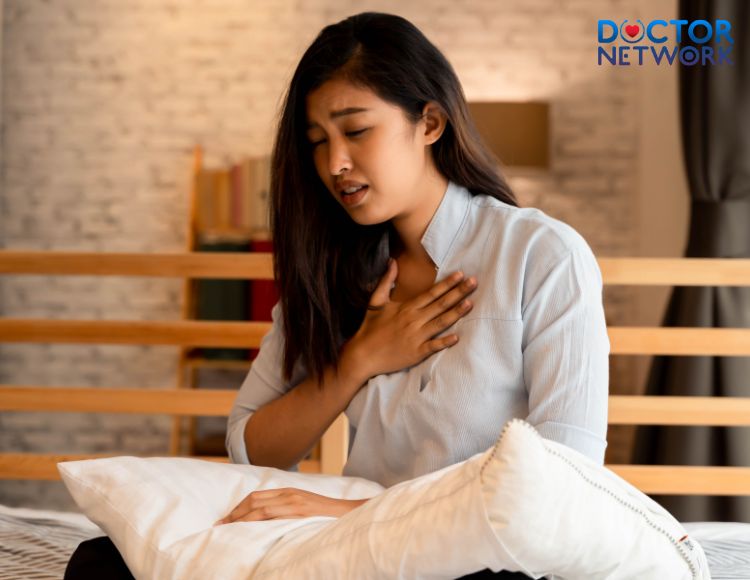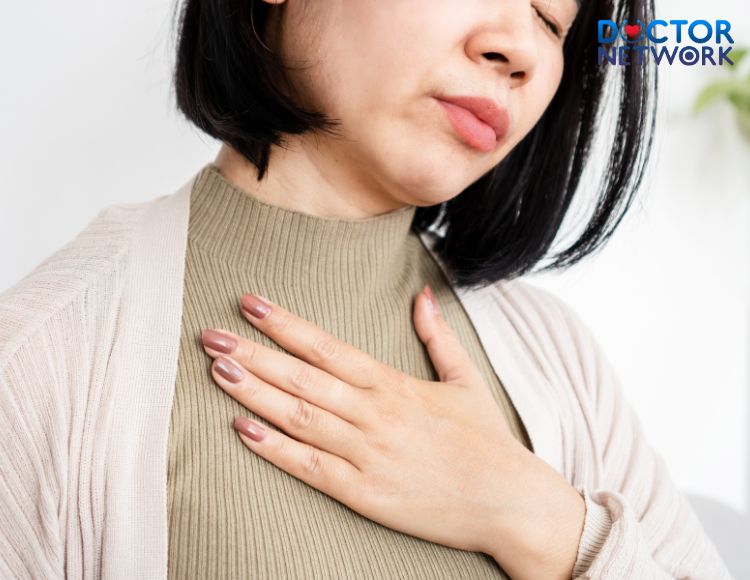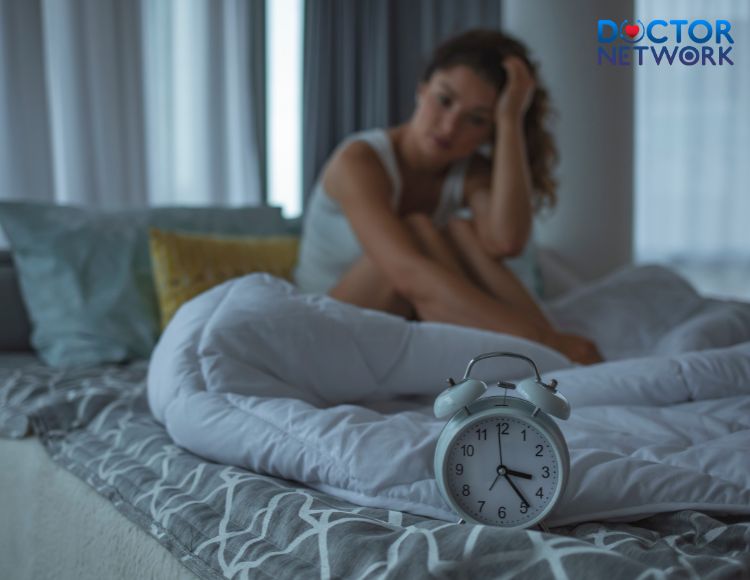Nighttime breathlessness, medically known as nocturnal dyspnea, is a distressing condition affecting millions worldwide. In this comprehensive guide, we’ll explore the causes of nighttime breathlessness and discuss effective ways to treat nighttime breathlessness. Whether you’re dealing with asthma, sleep apnea, or anxiety-induced breathing difficulties, this article will provide valuable insights to help you breathe easier and sleep better.
Understanding Nighttime Breathlessness
Nighttime breathlessness occurs when an individual experiences difficulty breathing or shortness of breath while lying down or during sleep. This condition can range from mild discomfort to severe episodes that disrupt sleep and cause significant distress.
Common Causes of Nighttime Breathlessness
| Cause | Description | Prevalence |
|---|---|---|
| Sleep Apnea | Breathing interruptions during sleep | 22% of adults |
| Asthma | Chronic lung inflammation | 8% of adults |
| Heart Failure | Weakened heart muscle | 2% of adults |
| Anxiety | Psychological stress | 19.1% of adults |
| GERD | Acid reflux | 20% of adults |
Understanding the root cause of your nighttime breathlessness is crucial for effective treatment. Always consult a healthcare professional for an accurate diagnosis.

Prolonged breathlessness affects cardiovascular health
7 Effective Treatments for Nighttime Breathlessness
Optimize Your Sleep Environment
Creating an ideal sleep environment is paramount in managing nighttime breathlessness. Ensure your bedroom is cool, dark, and quiet. Use hypoallergenic bedding to minimize allergens that could trigger respiratory issues.
- Maintain room temperature between 60-67°F (15-19°C)
- Use blackout curtains or an eye mask
- Invest in a high-quality air purifier with HEPA filter
Elevate Your Upper Body
Sleeping with your head and chest elevated can significantly alleviate nighttime breathlessness. This position helps reduce pressure on your diaphragm and lungs, making breathing easier.
- Use an adjustable bed or wedge pillow
- Aim for a 30-45 degree angle of elevation
- Ensure proper neck support to avoid strain
Practice Deep Breathing Exercises
Incorporating deep breathing techniques into your nightly routine can help relax your respiratory muscles and improve oxygen flow. The “4-7-8” breathing method is particularly effective:
- Inhale through your nose for 4 seconds
- Hold your breath for 7 seconds
- Exhale slowly through your mouth for 8 seconds
- Repeat 4-5 times before bed
Manage Underlying Medical Conditions
Effectively treating the root cause of your nighttime breathlessness is crucial for long-term relief. Work closely with your healthcare provider to develop a comprehensive treatment plan.
| Condition | Treatment Options |
|---|---|
| Sleep Apnea | CPAP therapy, lifestyle changes |
| Asthma | Inhalers, long-term control medications |
| Heart Failure | Medications, lifestyle modifications |
| Anxiety | Cognitive Behavioral Therapy, relaxation techniques |
| GERD | Antacids, proton pump inhibitors, dietary changes |
Implement Lifestyle Changes
Making strategic lifestyle modifications can significantly improve nighttime breathlessness:
- Maintain a healthy weight through balanced diet and regular exercise
- Avoid trigger foods and late-night meals
- Quit smoking and limit alcohol consumption
- Practice stress-reduction techniques like meditation or yoga

Breathlessness affects quality of life
Use Humidifiers and Essential Oils
Dry air can exacerbate respiratory issues. A humidifier can add moisture to the air, making breathing easier. Additionally, certain essential oils have properties that may help open airways and promote relaxation.
- Use a cool-mist humidifier in your bedroom
- Try eucalyptus or peppermint essential oils (always dilute properly)
- Clean your humidifier regularly to prevent mold growth
Consider Supplementary Oxygen Therapy
For severe cases of nighttime breathlessness, especially those related to chronic conditions like COPD, supplementary oxygen therapy may be prescribed by your doctor. This treatment can significantly improve oxygen levels during sleep, leading to better rest and reduced breathlessness.
- Follow your doctor’s instructions carefully
- Regular maintenance of oxygen equipment is crucial
- Be aware of safety precautions when using oxygen at home
When to Seek Immediate Medical Attention
While the strategies above can be highly effective, it’s crucial to recognize when nighttime breathlessness requires urgent medical care. Seek immediate help if you experience:
- Severe shortness of breath that doesn’t improve with rest
- Chest pain or pressure
- Bluish tint to lips or fingertips
- Rapid or irregular heartbeat
- Confusion or dizziness
Remember, nighttime breathlessness can be a symptom of serious underlying conditions. Regular check-ups and open communication with your healthcare provider are essential for optimal management and peace of mind.
By implementing these seven effective strategies and working closely with your healthcare team, you can significantly improve your nighttime breathing and overall quality of life. Don’t let nighttime breathlessness rob you of restful sleep – take action today for better breathing tonight.

Avoid allergens such as dust and pet dander
Frequently Asked Questions about “7 Extremely Effective Ways to Treat Nighttime Breathlessness”
1. What are the most common causes of nighttime breathlessness?
The most common causes of nighttime breathlessness include:
- Sleep apnea: A condition where breathing repeatedly stops and starts during sleep.
- Asthma: A chronic respiratory condition characterized by inflamed and narrowed airways.
- Congestive heart failure: When the heart can’t pump blood effectively, leading to fluid buildup in the lungs.
- Gastroesophageal reflux disease (GERD): Acid reflux that can irritate the airways and cause breathing difficulties.
- Anxiety disorders: Panic attacks or anxiety can lead to hyperventilation and breathlessness.
- Chronic obstructive pulmonary disease (COPD): A group of lung diseases that obstruct airflow.
2. How can I differentiate between nighttime breathlessness and sleep apnea?
While nighttime breathlessness and sleep apnea can have similar symptoms, there are key differences:
- Nighttime breathlessness: You may wake up feeling short of breath or gasping for air. This sensation often improves when you sit up or stand.
- Sleep apnea: Characterized by loud snoring, choking or gasping sounds during sleep, and daytime fatigue. A bed partner might notice pauses in your breathing during sleep.
To definitively diagnose sleep apnea, a sleep study (polysomnography) is typically required. If you suspect either condition, consult a healthcare provider for proper evaluation.
3. Are there any natural remedies that can help alleviate nighttime breathlessness?
Yes, several natural remedies may help alleviate nighttime breathlessness:
- Eucalyptus oil: Known for its decongestant properties, it can be used in a diffuser or as a chest rub.
- Ginger tea: May help reduce inflammation in the airways.
- Steam inhalation: Can help open up airways and loosen mucus.
- Pursed-lip breathing: A technique that can help slow down breathing and reduce shortness of breath.
- Buteyko breathing method: A series of breathing exercises designed to improve respiratory function.
However, it’s important to note that these should not replace medical treatment for underlying conditions. Always consult with a healthcare provider before trying new remedies.
4. How does obesity contribute to nighttime breathlessness, and can weight loss help?
Obesity can contribute to nighttime breathlessness in several ways:
- Increased pressure on the diaphragm: Excess weight in the abdominal area can push up on the diaphragm, reducing lung capacity.
- Higher risk of sleep apnea: Obesity is a major risk factor for obstructive sleep apnea.
- Increased inflammation: Obesity is associated with chronic low-grade inflammation, which can affect the respiratory system.
Weight loss can significantly help reduce nighttime breathlessness by:
- Decreasing pressure on the diaphragm and lungs
- Reducing the risk and severity of sleep apnea
- Improving overall cardiovascular health
Even a modest weight loss of 5-10% of body weight can lead to noticeable improvements in breathing and sleep quality.
5. When should I seek emergency medical attention for nighttime breathlessness?
You should seek emergency medical attention if you experience:
- Severe shortness of breath that doesn’t improve with rest or your usual medications
- Chest pain or pressure accompanying the breathlessness
- Bluish tint to your lips, fingertips, or skin (cyanosis)
- Rapid or irregular heartbeat
- Confusion, dizziness, or fainting
- Fever along with breathlessness, which could indicate a respiratory infection
These symptoms could indicate a serious underlying condition such as a heart attack, pulmonary embolism, or severe asthma attack, all of which require immediate medical intervention. When in doubt, it’s always better to err on the side of caution and seek medical help.
Scientific Researches on “7 Extremely Effective Ways to Treat Nighttime Breathlessness”
- “Effect of Nocturnal Oxygen Therapy on Sleep Apnea in Chronic Heart Failure” by Javaheri et al. (2016), published in the New England Journal of Medicine. This study examined the effectiveness of nocturnal oxygen therapy in treating sleep-disordered breathing in patients with heart failure.
- “Elevated Head of Bed in Nocturnal Gastroesophageal Reflux Disease: A Systematic Review” by Khan et al. (2018), published in the Journal of Gastroenterology and Hepatology. This meta-analysis looked at the impact of elevated head position on reducing nighttime GERD symptoms, including breathlessness.
- “Yoga for Asthma: A Systematic Review and Meta-Analysis” by Yang et al. (2016), published in Annals of Allergy, Asthma & Immunology. This study evaluated the effectiveness of yoga in managing asthma symptoms, including nighttime breathlessness.
References:
https://www.dispatchhealth.com/blog/shortness-of-breath-at-night/
Kiểm Duyệt Nội Dung
More than 10 years of marketing communications experience in the medical and health field.
Successfully deployed marketing communication activities, content development and social networking channels for hospital partners, clinics, doctors and medical professionals across the country.
More than 6 years of experience in organizing and producing leading prestigious medical programs in Vietnam, in collaboration with Ho Chi Minh City Television (HTV). Typical programs include Nhật Ký Blouse Trắng, Bác Sĩ Nói Gì, Alo Bác Sĩ Nghe, Nhật Ký Hạnh Phúc, Vui Khỏe Cùng Con, Bác Sỹ Mẹ, v.v.
Comprehensive cooperation with hundreds of hospitals and clinics, thousands of doctors and medical experts to join hands in building a medical content and service platform on the Doctor Network application.


























